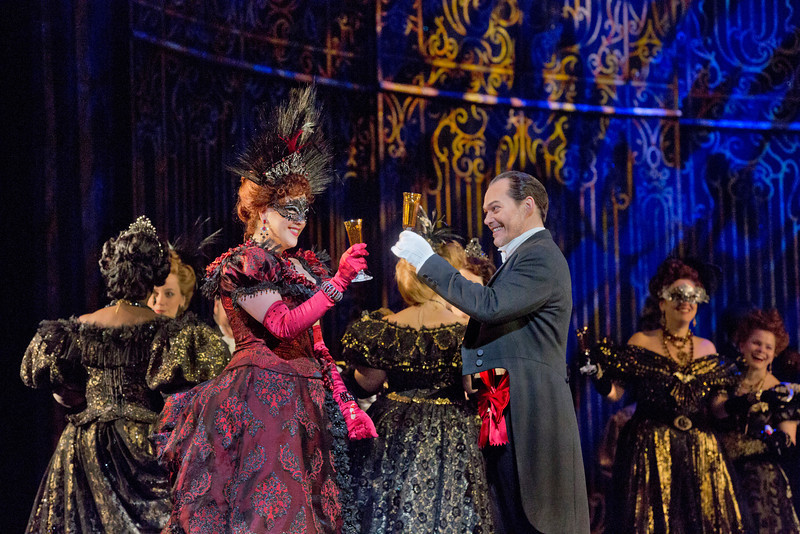Met rings in the new year with a glam and glossy “Fledermaus”

Susanna Phillips as Rosalinde and Christopher Maltman as Eisenstein in the Metropolitan Opera’s new production of Johann Strauss, Jr.’s “Die Fledermaus.”
Photo: Ken Howard
The Metropolitan Opera promised audiences a “glittering” new Fledermaus for New Year’s Eve and they delivered. The new production by Jeremy Sams, with luxurious sets and costumes by Robert Jones, is a sumptuous four hours of eye candy.
The action is set on New Year’s Eve, 1899, and there are timely references to that fact scattered across the opera’s three acts, including a lingering Christmas tree in the Eisensteins’ living room in act one. The curtain opens on a set so startlingly red as to seem almost macabre, but the contrasting gold accents, including two enormous paintings on the back wall, make for an exceptionally warm ambience.
The set for act two seems almost a mockery of the prison for which Eistenstein was destined, a cage of gilded gates with a stunning and gigantic inverted dome in the middle. The most extravagant of the three scenes in terms of sheer magnitude is for Orlofsky’s ball, which features cocktail waitresses in kinky tutus who doubled as a dance troupe for the polka. These, in addition to the mobile chandelier and the confetti cannons, make the party an image of exotic excess far more alluring than the man behind the whole affair.
Prince Orlofsky, a mezzo-soprano trouser role, was here taken by the countertenor Anthony Roth Costanzo. There is little precedent for this particular switch, and here it did not work, though through no fault of Costanzo’s—he sang nimbly and clearly, but rare indeed is the countertenor who can make “Chacun à son gout” sound as effortlessly charming as a mezzo can. On Tuesday it was merely punchy.
Moreover, Costanzo had to jump through some directorial hoops, and though he did so convincingly, the characterization still felt cheap, leaning heavily on tired gay stereotypes, from haircut to limp wrist. He was also, despite being the host of the bash of the century, bizarrely contrary, coming off as an awkward, peevish third wheel at his own party.
The third act, though not as lavish as the two that preceded it, was no less elegant in its execution, a sickly sterile prison with jail cells along the back. The Broadway veteran Danny Burstein was absolute comedic gold as the inebriate and incompetent jailer Frosch, nearly stealing the entire show with his extended monologue at the top of the act. He showed no concern whatsoever for the fourth wall, coming down to the apron and telling the audience on the floor “You know how hard it is to work for a living” before hastily correcting himself and redelivering the line to the family circle.
The soprano Jane Archibald gave a splendid performance as the chambermaid Adele, relishing her assumed identity during the party scene with effortless coloratura giggles, but her finest moment came in the final act as she ran through a range of characters in her impromptu audition. Bright tone, soaring top notes, and coquettish warbling all came together in her winning couplets.
The rest of the cast was less enthralling dramatically. As Rosalinde, Susanna Phillips seemed largely uninterested in the spoken dialogue, delivering her lines with little enthusiasm, but the soprano came alive when she sang. Phillips had some trouble with her top notes, which sounded pinched throughout the night. In her Csardas she was slightly flat up high and she clipped her final note rather than holding it. Otherwise, there was not a hint of struggle in her voice, as she consistently brought plush, velvet tone to her singing.
As Eisenstein, Christopher Maltman also seemed disconnected from the dialogue, though he, like Phillips, was thoroughly engaged and engaging when singing. He has a thunderous, dark voice that was particularly effective as he lost his temper in the act three trio with his wife and her goofy would-be lover Alfred, played by the brassy-toned Michael Fabiano.
Paolo Szot had his trademark oaky sound working for him, but suffered from the same ennui that affected the leading couple, failing to bring any real charisma to the vengeful Dr. Falke. Betsy Wolfe made a one-note airhead of Adele’s sister Ida, while Patrick Carfizzi, singing with robust voice, gave an oddly foppish portrayal of the prison warden Frank.
Further frustration came from the pit, where Adam Fischer was far too reserved for much of the night. He led a spirited overture that was full of wit. Thereafter his direction had little sparkle, possibly because he was focused on keeping the ensemble intact. He held the orchestra together impeccably, but often found himself behind the singers, sometimes by several beats.
The new English libretto crafted for this production was hit-or-miss, as well. The book by Douglas Carter Beane often went out of its way to explain an innuendo. Meanwhile, Jeremy Sams’ lyrics were witty in the patter sections, but often clumsy elsewhere, with syllables that don’t quite fit over the music, and occasionally cringe-worthy rhymes (“Mistress/this dress” being among several examples).
And yet despite its shortcomings, this production’s stunningly gorgeous design is a gift to the Met’s repertory. Strauss’s timeless operetta is goofy, glittery, and delightful, and this staging has the necessary elements to match. A little tweaking in future runs might make it a very formidable addition to the company, indeed.
Die Fledermaus runs through February 22. metoperafamily.org

Posted May 01, 2014 at 9:17 am by Aidan Faughey
Hi Eric,
The final note for Rosalinde in the Csardas is a quaver.
This is what Strauss wrote. Some singers do sustain
the top D for the last two bars. I actually think it more
effectve sung as written. The conductor being behind
the beat with the stage is not necessarily his fault, but
singers not keeping an eye.
Aidan Faughey ( Ireland )